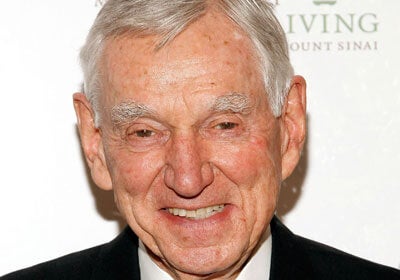Eat Food, Mostly Plants… Live Indefinitely?

Share
When lunchtime rolls around, what are you thinking about: your health or your hunger? We all want to eat healthier in theory, but for many of us, attempts at healthier diets tend to be sporadic and short lived. Which is unfortunate on the one hand, since reams of medical research is showing that eating "right" has a probabilistic effect on health -- and lifespan! On a demographic level and in controlled individual trials, people who eat better can live decades longer in excellent health. Meanwhile, the rest of us are getting by on whatever diet we've lucked into and relying on doctors to do the rest. But how long will we have to wait before researchers develop bio-technologies that will halt or even repair the damage caused to your body by aging? Are we doing enough in the mean time?
If it were up to David Murdock, he'd tell you to be doing more. A billionaire several times over, Murdock has lived the American dream, starting out destitute and penniless after World War II and later rising to prominence and fortune through business. But losing both his wife and mother to cancer several years ago radically altered his priorities and made him a man on a mission. Now he's investing his time and money to improve the state of health, biotechnology, and personal longevity... including his own. (He plans to live to 125!). His message: No matter what you pack for lunch there's likely lots of room for improvement -- and he's not afraid to tell you so. He's been featured on the Hub before, along with others of his cohort who believe the key to longevity is eating right and exercising. Average lifespan (and health-span) are correlated with lifestyle and diet is a big component of that. Individual supplements are touted as essential for anyone who wants to improve their chances of ultra-longevity - Ray Kurzweil famously takes over a hundred on a daily basis. And some people take this ethos to heart, devoting a huge portion of their lives to optimizing their meals and exercising so they can spend even longer doing it.
But there are reasons to be skeptical of claims like these too. Sure, Murdock enjoys enviable health and he's in his late eighties. But he didn't start his extreme healthful habits until his sixties and has always been "naturally slender": if he'd been predisposed to accumulate damage from eating his choice of less-saintly foods, it would have built up by the time he began his crusade. His wife Gabriele's cancer killed her when she was 43: she wasn't lucky enough to last until he learned the nutritional secrets he believes could have saved her.
Meanwhile, others who have lived long past their 100th birthdays such as Sakhan Dosova (who may have been as old as 130 when she died) rarely list their favorite foods as carrots or cantaloupe. Her favorite food: cottage cheese and ground wheat. We wouldn't have heard about her, or her predilection for dairy and carbs, if she hadn't gotten to such an impressive age - but by the same token, we would never have heard of someone like Murdock who used the same diet and wasn't doing as well. Why attribute health to diet, and not good genes, or any of the other predictors of low mortality? Murdock also has the advantage of being a billionaire: that helps.
Be Part of the Future
Sign up to receive top stories about groundbreaking technologies and visionary thinkers from SingularityHub.


Let's optimistically assume that Murdock and other who overhaul their lives to extend them are doing something right, and will get more years for their trouble. Even so, some people don't want to settle for lifestyle-based methods and the - at best - a few extra decades of extended life. SENS has been working on regenerative medicine, which is intended to remove cumulative harm done to the body using bio-technology that we can use to possibly repair damage. If it works as advertised, it doesn't have the upper bound of efficacy that lifestyle-based choices seem to have: you could keep patching yourself up until you were several centuries old, not just the one and a quarter Murdock plans for.
However, research in general progresses slowly, and you can't yet check in to a rejuvenation pod and emerge looking twenty-something every time you have another birthday. As long as there's a hint that passing on the bacon and filling up on blueberries will help, take advantage: they might let you live long enough to see the really snazzy tech.
Image credit: jemal countess/getty images
Related Articles

One Dose of This Gene Editor Could Defeat a Host of Genetic Diseases Suffered by Millions

Groundbreaking Gene Therapy Transforms Life of Boy With Devastating Disorder

Scientists Say We Need a Circular Space Economy to Avoid Trashing Orbit
What we’re reading

